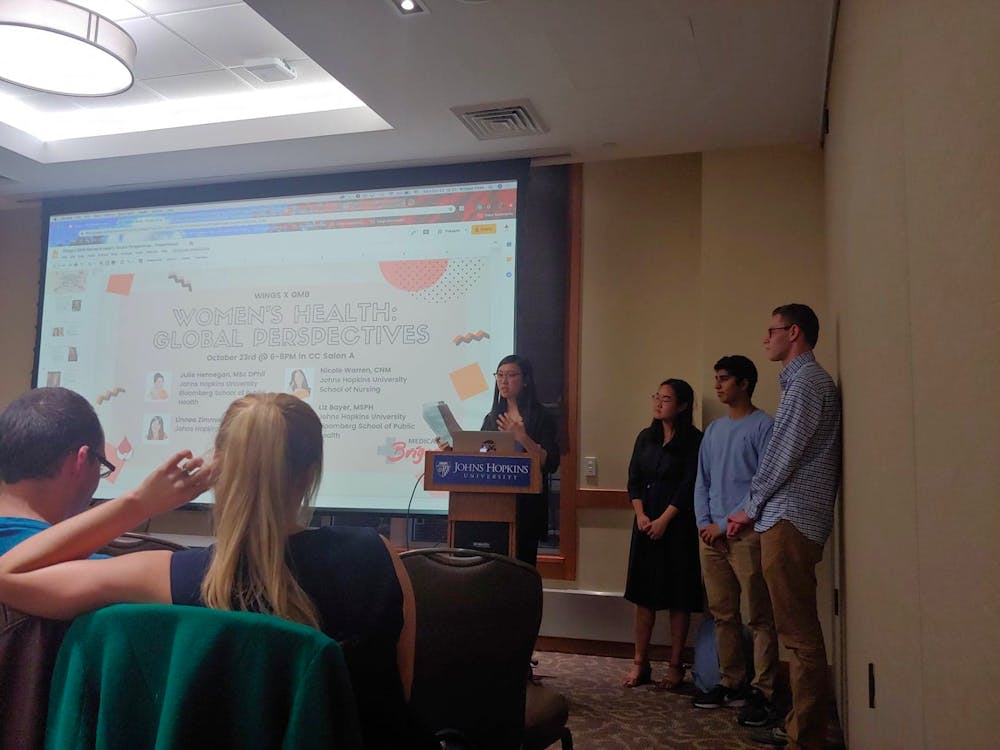Thousands of women around the world die every year of maternal mortality. Millions more suffer from stigmas and cultural misconceptions around women’s health.
In recognition of the importance of the taboo topic of women’s menstruation and health, Wings and Global Medical Brigades came together to host four panelists specializing in research and advocacy for their fall speaker event, Women’s Health: Global Perspectives.
The panelists, Liz Bayer, a program officer with Advance Family Planning; Nicole Warren, associate professor at the Hopkins School of Nursing, Julie Hennegan, research associate at the Bloomberg School of Public Health; and Linnea Zimmerman, the principal investigator of the Performance Monitoring and Accountability of the Ethiopia project, discussed the disparities in women’s health care and the immense amount of work and research that has yet to be done.
In 2017 the World Health Organization reported that approximately 295,000 women died of maternal mortality, averaging to 810 women every day.
Maternal Mortality has been defined as the death of a woman due to complications during and after pregnancy and childbirth. Although the rate has decreased by 38 percent since 2000, Zimmerman explained that the rates are still staggeringly high, especially from lower income counties.
“Most of my work is trying to understand why,” Zimmerman said. “The fact that 94 percent of maternal deaths occur in low and middle income countries is evidence that we know what works — and we’re not doing it in low and middle income settings.”
Through her research, Zimmerman identified that while there are emergencies and maternal deaths in wealthier countries like the United States that even the best doctors cannot prevent, disparities in wealth have proven deadly to millions of women around the world.
Though there are many barriers to effective treatment and care, including lack of resources or information, or even cultural or religious beliefs, the panelists agreed that educating women about their options and ensuring that health-care professionals obtained clear and thoroughly researched guidelines would be imperative to improving women’s health. Zimmerman explained how this will lead to female health empowerment.
“We need to prepare women so that they can make the right decisions,” Zimmerman said.
In addition to the issue of maternal mortality, the panelists also discussed how health-care professionals should address and change their perspectives on female genital cutting (FGC). Warren suggested a change in the perspective of FGC.
“FGC is not a uniquely African issue,” Warren said.
Although many victims come from Sub-Saharan Africa, the practice transcends cultural, religious, ethnic and socio-economic lines. According to the United Nations Population Fund, FGC is also practiced in the Middle East, Asia, Eastern Europe, Latin America and in some migrant communities in Western Europe, New Zealand, North America and Australia.
While the United Nations Population Fund also reported that an estimated 200 million girls and women around the world are living with female genital mutilation, Warren explained that the stigmas surrounding the issue has resulted in little research and an inherent disregard to different cultural perspectives.
“My big concern as a nurse midwife is the really poor care that these women are getting,” Warren said. “There is not a single professional organization in the U.S. who has published guidelines on caring for these women. Not one.”
Through each presentation one thing remained clear: the silence and cultural taboos surrounding women’s health must be broken.
As an aspiring professional in the field of public health and a member of Wings, Sophomore Georgia Parsons found the discussion aligned with her personal interests within her field of study.
“One of my main interests in Public Health is definitely women’s health, especially globally,” Parsons said in an interview with The News-Letter. “I’m super interested in international health and development, that’s why I was really excited when I found out that we as Wings were putting on this event with Global Medical Brigades.”
Founded by Hopkins seniors Bridget Chen and Chanel Lee, Wings has established itself as a local organization striving to fight menstrual inequality in at-risk communities and to break the stigmas surrounding women’s health and well-being.
Chen quoted Hennegan’s panel presentation on menstrual health and resources during an interview with The News-Letter.
“Good intentions doesn’t always mean good impact,” Chen said.
Chen explained that she and members of Wings wanted to put together this event for students who are interested in the pre-med track so they could understand how stigmas and lack of cultural knowledge has led to disparities in health care quality for different communities.
“I think that these four speakers do a good job of putting on the table misconceptions about health that physicians and health care providers are still perpetuating,” Chen said.
“This continual misinformation is not helping people who actually need a specific type of help and you know that could be with regards to menstrual health, reproductive health, maternal mortality, and female genital cutting.”
Wings has hosted youth health workshops and supplied at-risk Baltimore communities with care packages comprised of essential products for women, and in the future the organization plans to share ideas with the Hopkins community on how to enhance the University’s efforts to meet the needs of its female students.

















